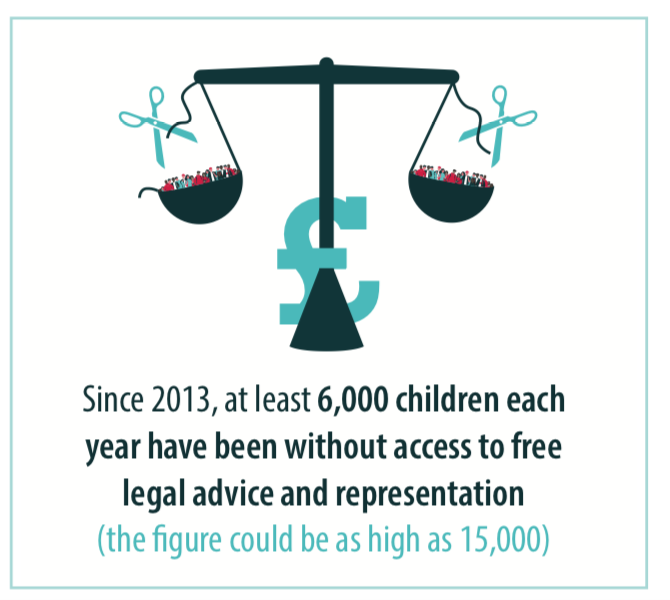At least 6,000 children have been denied legally-aided advice and representation every year since the 2013 legal aid cuts came into force, according to new research which found that the figure could be as high as 15,000. In a report released by the Children’s Rights Alliance for England (CRAE) today, 90 children’s charities warn that several serious children’s rights issue must be urgently addressed by the UK Government to prevent worsening impacts on the most vulnerable children.
The report, produced to inform the UN Committee on the Rights of Child, specifies 30 critical issues that must be addressed immediately. Despite some progress being underlined, the report concludes that children’s rights and voices have been constantly overlooked by the Government and remains low on the political agenda.
The report highlighted the impact of the 2013 legal aid cuts and their impact on children unlawfully excluded from schools, those involved in SEND appeals, care leavers and separated children in immigration cases once they turn 18. CRAE calls the ‘Exceptional Case Funding ‘ regime, the so called safety net mechanism introduced in 2013 to allow funding for cases where human rights are breached, ‘woefully inadequate’.
CRAE, which is part of the legal charity Just for Kids Law, highlight that the response to Covid-19 is a prime example of the way that the Government has failed to prioritise children’s rights. According to the report, a tranche of emergency legislation and regulations was brought in during the pandemic without any parliamentary scrutiny, consultation period, or consultation with the Children’s Commissioner, demonstrating the worrying absence of democratic scrutiny for children’s rights. The report found that many regulations, such as the regulations on children social care, had ‘significantly watered-down protections.’ The Court of Appeal later found their adoption unlawful in Article 39 v the Secretary of State for Education.
‘The findings of our report make for disheartening reading: children are being failed in many aspects of their lives and their rights are not being respected,’ commented Louise King, CRAE’s director. ‘Children continue to be a low political priority, and this been exacerbated during the pandemic. The UK Government needs to take urgent action to embed children’s rights into domestic law to ensure we don’t fall further behind progress being made in Scotland and Wales and that children’s rights are at the centre of the country’s recovery from the pandemic.’
Key findings:
- Black children continue to suffer discrimination across many aspects of their lives; they are disproportionately represented in school exclusions and in the criminal justice system. Children from minority ethnic backgrounds are more likely to receive harsher levels of punishment, and now make up more than half of the population of children in prison. The government has devised no strategy or targets to address this.
- Abuse and neglect of children is still on the rise, with the number of children subject to a child protection plan increasing from 50,310 children in 2016 to 52,330 children in 2019. Physical punishment of children is still legal in England in the home and private foster care whereas Scotland and Wales have made progress to ban physical punishment of children.
- Child criminal exploitation (CCE) is the most commonly reported type of exploitation. Around 90,000 children in England live in institutional settings and the Independent Inquiry into Child Sexual Abuse has heard extensive evidence of sexual abuse against children in these establishments.
- Child poverty is rising, with 4.2 million children living in poverty in the UK. Families in poverty are now in deeper poverty than five years ago. The economic impact of Covid-19 and Brexit is predicted to further increase child poverty.
- The Government’s punitive Hostile Environment has had an impact on the rights of children causing 215,000 undocumented children in the UK who face major barriers to regularising their status.
- Legal aid is still unavailable for many children and families. Since 2013, at least 6,000 children each year have been denied free legal advice representation.
The CRAE report found that the Government has failed to prioritise children or their rights since 2016 when the UK was last examined. England has made no effort to incorporate the UN Convention on the Rights of the Child (UNCRC) into domestic law and refused to do so unlike Scotland. Notably, the report views Brexit as posing considerable risks to children’s rights. It had failed to assure that it won’t repeal the Human Rights Act, which has a risk of having serious implications for children’s rights protections. The EU (Withdrawal) Act excluded the EU Charter of Fundamental Rights from being transposed into UK law, which provided specific rights to children that are absent in domestic law.
‘Since the last UNCRC examination in 2016, child poverty has been rising, and as a result of Coronavirus things are likely to get worse for children and their families before they get better,’ said Alison Garnham, chief executive of the Child Poverty Action Group. ‘Without co-ordinated national action to tackle child poverty in the UK, a generation of children will be deprived of their basic rights to a safe and secure home, an adequate education, and a healthy childhood. This report sets out some of the key areas the UK government should focus on if they are serious about protecting children’s rights in the UK. This starts with taking meaningful action to tackle child poverty.’







